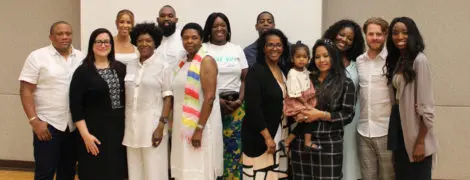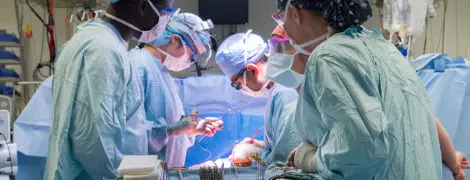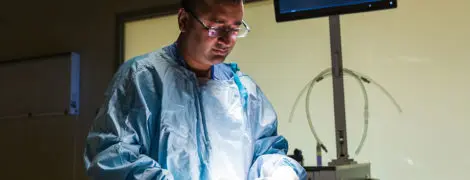Stempien-Otero’s persistence paid off. The transplant team rapidly assessed that Llapitan was indeed a candidate for transplant.
“I think that having people stand up and speak for those of us who may not be the standard cases is so important,” says Llapitan. “Dr. Stempien-Otero was my main advocate and my biggest voice.”
But transplant recipients must be cancer-free for at least a year. To get Llapitan to that point, her team used an implanted heart pump called a tandem heart, placed using an innovative technique developed by Jamie McCabe, MD, FACC, section chief of interventional cardiology. The procedure involves inserting lines into veins on both legs, crossing one line into the aorta internally, then connecting the lines to an external pump. It’s physically demanding and carries its own risks, but it was Llapitan’s best chance.
In early September 2020, still in the cardiac ICU, Llapitan officially celebrated a year of being cancer-free and was placed on the heart transplant list. Weeks later, she had transplant surgery, and after two weeks in the hospital, Llapitan went home.
Three months after transplant, Llapitan can climb stairs and walk several miles. She’s thrilled at her progress and hopes to be running again at the six-month mark.
“I am so amazed by their knowledge, wisdom, compassion and empathy,” says Llapitan of her care team. “They’re incredibly smart and they work together as a team. I wouldn’t have wanted to be any place other than UW Medicine.”
From breast cancer, to heart disease, to transplant and survivorship, Llapitan’s experience reflects the many ways that the UW Medicine Center for Women’s Heart Health would help provide women with a lifetime of heart health care.
“Having an advocate who understands what you’re going through and can help you make those hard decisions is just part of what we’re trying to achieve with the Women’s Heart Health Center,” says Stempien-Otero.
Today, Llapitan, who recently retired as a King County Superior Court clerk, is focused on recovering and spending time with her husband. She’s thankful for Stempien-Otero and others who advocated for her and gave her a new lease on life, and she’s thinking about how to pay that forward.

“Every day I’m grateful — it’s a new gift of life,” says Llapitan. “I think of the donor often. Someone died so you could have a new life, and it makes you think of how you’re going to honor it. You don’t want to waste that gift; it’s huge.”
Written by Stephanie Perry















